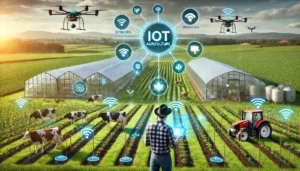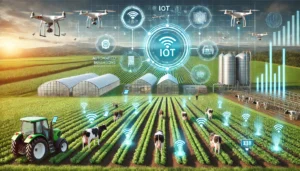

A Smart IoT System for Agriculture uses Internet of Things (IoT) devices, sensors, and automation to improve farming efficiency, reduce costs, and maximize crop yield. It integrates various technologies like cloud computing, AI, and big data analytics for real-time monitoring and decision-making.
Key Components of a Smart IoT Agriculture System:
-
Sensors
-
Soil Sensors: Measure moisture, temperature, pH, and nutrient levels.
-
Weather Sensors: Track temperature, humidity, rainfall, wind speed, etc.
-
Water Sensors: Monitor water levels in reservoirs and irrigation systems.
-
Pest & Disease Detection Sensors: Detect insect activity and plant diseases.
-
-
IoT Devices & Connectivity
-
Smart Irrigation Systems: Automated irrigation based on soil moisture data.
-
Drones & Cameras: Used for crop health monitoring and surveillance.
-
Livestock Monitoring: Wearable sensors track animal health and location.
-
Greenhouse Automation: Controls temperature, humidity, and light for optimal plant growth.
-
Cloud Connectivity: Data is stored and analyzed in cloud platforms (AWS, Google Cloud, etc.).
-
Wireless Communication: Uses LoRa, Wi-Fi, 4G/5G, and Bluetooth for device connectivity.
-
-
AI & Data Analytics
-
Predictive Analytics: AI models forecast weather conditions and disease outbreaks.
-
Yield Prediction: Uses historical data to estimate production.
-
Automated Decision-Making: AI-driven recommendations for fertilizers, pesticides, and irrigation.
-
-
Mobile & Web Applications
-
Real-Time Dashboard: Farmers can monitor and control systems remotely.
-
Alerts & Notifications: Warnings for adverse weather, water shortages, or pest infestations.
-
Automated Reports: Daily, weekly, and seasonal farm analysis reports.
-
![]()
Benefits of Smart IoT Agriculture
✅ Increased Efficiency: Automates labor-intensive tasks like irrigation and fertilization.
✅ Higher Yield: Data-driven insights help optimize crop growth.
✅ Water & Resource Conservation: Smart irrigation reduces water wastage.
✅ Cost Savings: Reduces labor costs and optimizes fertilizer/pesticide use.
✅ Sustainability: Minimizes environmental impact with precision farming.